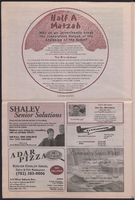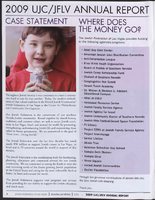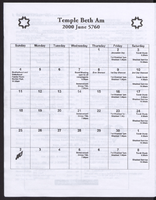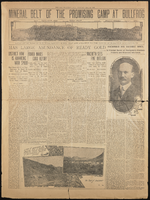Search the Special Collections and Archives Portal
Search Results

Correspondence, Levi Syphus to Thomas Toland
Date
Archival Collection
Description
Text
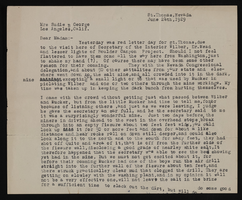
Correspondence, Levi Syphus to Sadie George
Date
Archival Collection
Description
Text
Dunes Hotel Photograph Collection
Identifier
Abstract
The Dunes Hotel Photographs (1950-1993) consist of administrative, publicity and entertainment images documenting the history of the Dunes Hotel and Casino in Las Vegas, Nevada. In addition to materials focusing on day-to-day activities at the hotel (correspondence, contracts, personnel, budgets, etc.) the collection provides insight into the hotel’s entertainment and public relations activities. Although there are chronological gaps in the collection, particularly during the later years of the Dunes (1970s-1990s), it provides a significant amount of historical documentation on the famed Strip hotel that was long known to tourists and residents alike as the “the Miracle in the Desert.”
Archival Collection
Dunes Hotel and Casino Records
Identifier
Abstract
The Dunes Hotel and Casino Records are comprised of administrative, publicity, and entertainment materials documenting the history of the Dunes Hotel and Casino in Las Vegas, Nevada from the years 1954 to 1992. Included are correspondence, contracts, photographs, hotel budgets, and an early aerial photograph of the property. The material provides a significant amount of historical documentation of the hotel that was long known to tourists and residents as the "the Miracle in the Desert."
Archival Collection

Astrid Silva oral history interview: transcript
Date
Archival Collection
Description
Oral history interview with Astrid Silva conducted by Monserrath Hernández and Barbara Tabach on April 22, 2019 for the Latinx Voices of Southern Nevada Oral History Project. Astrid Silva was born in Gomez Palacio, Durango in 1988. She immigrated with her mother to the United States in 1992, where they were met by her father before flying to Los Angeles. She recounts her first impression of the United States and her families eventual move to Las Vegas, where she describes her time living in Las Vegas' west side and struggles she faced being an undocumented student living in Las Vegas. She describes her first meeting with Senator Harry Reid and the friendship that developed afterwards. She has spoken at the Democratic National Convention and has been vocal about her status as a Dreamer. She is currently the Executive Director for DREAM Big Nevada which was established in 2017 in order to provide aid to Nevada's immigrant families. She writes about her hopes for Dreamers and her continued work in expanding the ways that immigrant families can be helped in an always changing political climate. Subjects discussed include: DACA, Dreamers, Immigrant Rights, and Higher Education.
Text

Transcript of interview with Richard Erbe by Marcela Yepes, March 19, 1978
Date
Archival Collection
Description
On March 19, 1978, Marcela Yepes interviewed Richard Erbe (born 1922 in El Monte, California) about his experiences in Las Vegas, Nevada and specifically about his career in education. Erbe first talks about his family background and German ancestry before describing how he ended up moving to Nevada. He then describes his wife’s father’s background in the gaming industry and some of the early illicit casinos that existed in California. The interview shifts to Erbe’s educational background, his first teaching position as a fifth grade teacher, his experience in the military, and his reasoning for not seeking employment in the gaming industry. The two also discuss church activity, politics, and social activities in Las Vegas. The latter part of the interview includes Erbe’s viewpoints on the issues in the educational system, his experiences as a principal at multiple Clark County schools, and some of the challenges he encountered in the administrative side in the field of education.
Text

